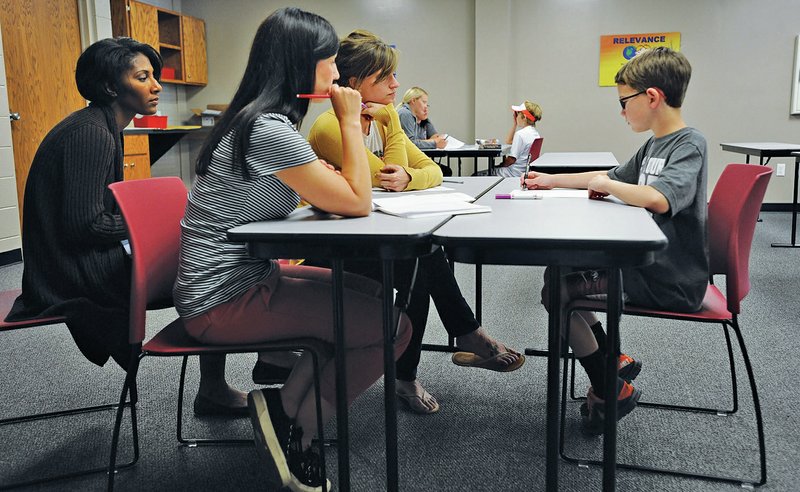FAYETTEVILLE -- The tables turned slightly this week when children were teaching the teachers about math.
Elementary mathematics teachers from Fayetteville, Springdale and Rogers are participating in a four-year study with University of Texas researchers to see how children in third through fifth grade think about math and how they process knowledge to solve a problem.
At A Glance
What Is CGI?
Cognitively guided instruction is a teacher professional development program based on 20 years of research by university professors and elementary school teachers from across the country. Teachers explore how elementary school children learn concepts of numbers, operations and early algebra. Teachers learn how to use this framework to form mathematics instruction.
Source: www.teachersdg.org
Correction
A previous version of this story incorrectly identified the university where Vicki Jacobs works. The error has been corrected.
Susan Empson, from the University of Texas, and Vicki Jacobs, from the University of North Carolina at Greensboro, are doing the study. They chose Arkansas because of the quality of professional development teachers receive. State law requires teachers to take 60 hours of professional development each year.
"We want to help teachers understand mathematical thinking," said Empson in summarizing the program. "We're interested in what teachers learn. The bridge between between the course and the classroom can be difficult."
The research and professional development could be called where the rubber meets the road, the researchers agreed.
Twenty children visited with the teachers last week at the Professional Learning Center in Fayetteville. With a promise of ice cream at the end of the hour session, the students were asked to solve word problems involving fractions.
Students had to calculate how much cheese it took to make 10 pizzas if the recipe called for two-thirds of a cup for each pizza. Another problem asked how many vases an artist could make if he had eight blocks of clay and each vase required three-fourths of a block.
Researchers observed the teachers while the teachers observed how the students solved the problem.
The children were from the Fayetteville Boys & Girls Club or were children of teachers who were "volunteered" for the afternoon.
John Griesse, a fourth-grade teacher at Root Elementary School in Fayetteville, said the professional development will help him.
"Students can dive deeper into understanding what's behind numbers and unlock the skill in their own learning," Griesse said. "It provides more flexibility."
Shannon Carter, a fourth grade teacher at Leverett Elementary School in Fayetteville, said, "You as a teacher realize kids can do more than we know. This is eye opening for me. The teaching is more about problem solving.
"Children are not just memorizing a formula that they soon forget," Carter said. "A teacher can make anything a math problem. That makes integration even more so."
The researchers are doing the study to expand a teaching strategy known as cognitively guided instruction to help students gain a deeper understanding of math, especially fractions. The method of instruction also helps teachers learn how to make decisions in the classroom tailored to the individual student's progress on the problem.
The study is a special section of a professional development course called "Extending Children's Mathematics," offered through Teachers Development Group.
Teachers Development is a nonprofit organization dedicated to improve mathematical understanding and achievement by all students through professional development. The two Texas researchers received a grant from the National Science Foundation for the study.
About 100 teachers for third through fifth grades from the three school districts will participate in the study over the next four years. Some of the teachers started the program last summer and a second group starts today.
Teachers also participate in four days of professional development during the school year for the study.
NW News on 07/21/2014

